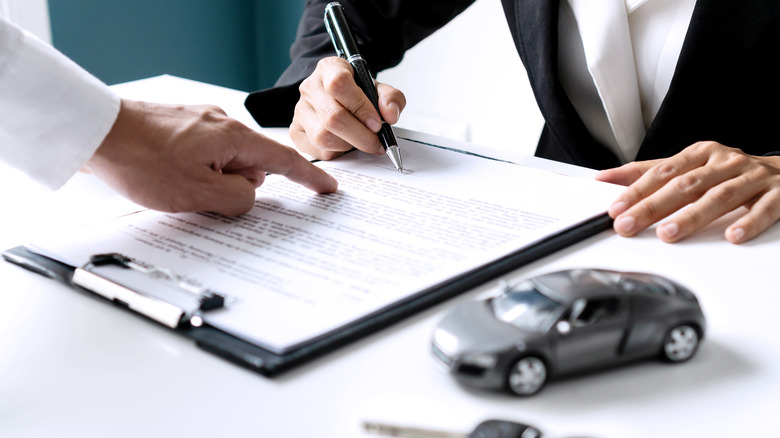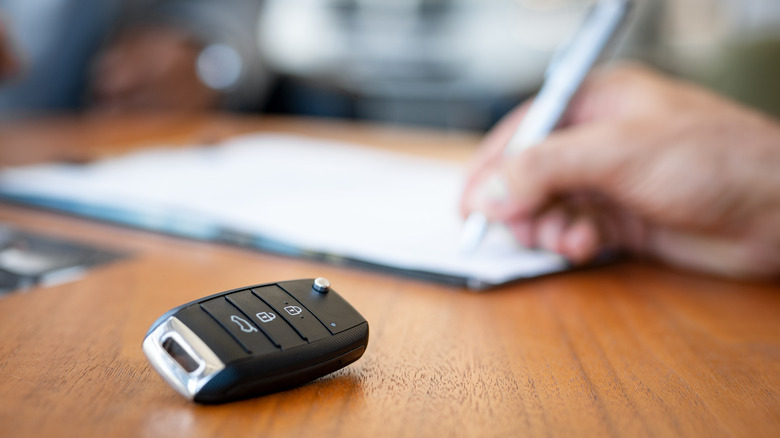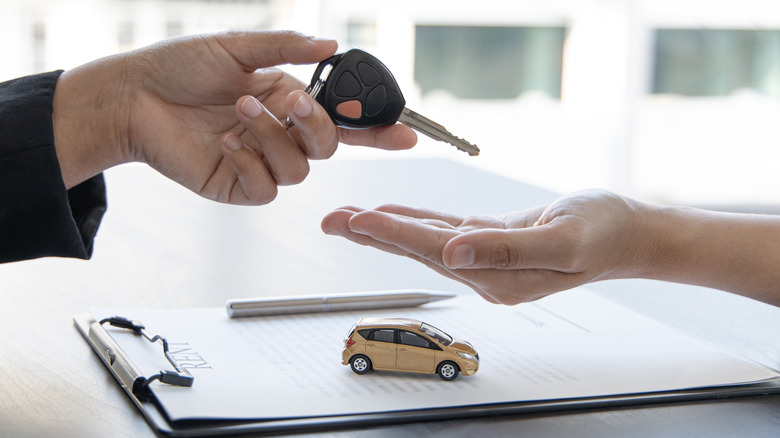Everything You Should Know Before Leasing A New Car
Aside from a home, buying a car is one of the biggest purchases most people will ever make. Outside of the most densely populated cities, such as New York or Chicago, an automobile is imperative for many to live and work in the United States, according to a study published in the journal Nature.
Because of this, purchasing a car becomes an unavoidable task. While picking out a new car can be an exciting and emotional experience, it presents an abundance of choices to make. Options for financing abound, and unsavvy buyers risk financial hardship from bad choices. For a substantial portion of new car buyers, leasing is the ideal choice, such as for those looking for a lower monthly payment (via Investopedia). In order to be armed with as many tools as needed to negotiate the best deal before walking into a dealership, here is everything you need to know before leasing a new car.
What is a lease?
The first thing to know about leasing is what it is, how it works, and how leasing differs from purchasing a vehicle with a loan. To break it down to its most basic elements, a lease offers the right to drive and enjoy a vehicle, but not to keep it. Leases are generally written for a term of 36 to 48 months, and, at the end of the term, the car must be returned to the dealer where purchased, Investopedia notes. From there, the lessee has the option to purchase the vehicle at a pre-determined amount that is specified in the lease agreement.
Contrast this with buying a car through private financing. When a car is purchased with a loan you retain full ownership and have no obligation to the dealer or financier after paying it off (via Credit Karma). Many variables exist in the specific details of these arrangements, so they should be studied rigorously before choosing.
Why consider a lease?
Perhaps the most difficult decision is determining whether a loan or lease is the right choice in the first place. No matter what, a new car purchase represents a significant financial obligation that can cause lasting financial harm if the terms are not fulfilled through to the end of the loan or lease. Regardless of the method of financing, new cars depreciate the moment they are registered to the buyer.
This act instantly changes a new car into a used one. According to NerdWallet, new cars depreciate up to 30% in the first year alone, and continue to depreciate up to 18% per year in subsequent years. The decision to lease or buy is essentially a decision about how to handle depreciation. No matter how you obtain a new car, you will be losing money due to depreciation, and a lease payment essentially covers the cost of the depreciation throughout the term of the lease such that when it is returned, the dealer can benefit from the residual value and sell it as a used car. As the lessee, you then are off the hook for any losses incurred due to future maintenance or lack of sale.
Another way to look at the lease is that it effectively eliminates your long-term commitment. You return the car to the dealer at the end of the lease term, and are then free to re-evaluate your automotive needs going forward.
How does a lease work?
Terms of a lease are specified with clear details and include several conditions unique to a lease for a new vehicle (via Bankrate). With this come many other stipulations. Investopedia details these conditions, which may include a limit on miles driven per year, required maintenance, penalties for missed payments, and penalties for early termination. Insurance is mandatory and limits are generally higher than the requirements of a typical lending institution, resulting in higher insurance premium payments.
Routine maintenance may be covered in some plans as an incentive to keep the car in good mechanical condition, Investopedia notes, and most leases do not extend beyond the warranty period so that significant repair costs are avoided. Leases generally require some sort of down payment, but promotions can bring this requirement down to a minimal sum or nothing at all.
Trade-in vehicles may also substitute for cash-down payments, per Investopedia. Lease payments consist of something similar to a principle and interest component as in a traditional auto loan, but they are figured differently and use different terms. The bulk of the payment is the "capitalized cost," which represents the depreciation of the vehicle paid each month and is similar to a principal payment. The "money factor" is the additional fee charged for the lease, much like an interest payment, and is the profit the leasing company enjoys for extending credit on the lease (via Edmunds).
Is a lease or loan right for me?
Many reasons exist in favor of leasing a vehicle. Consumer Reports lays out the argument for and against, but, ultimately, says that there is no easy answer as everyone has a unique situation. Businesses often lease cars to have an expense to be used for tax purposes without retaining a depreciating asset. The specific benefits for tax purposes are complex and it is advisable to consult an accountant or tax attorney to consider the actual benefits. However, besides any possible tax benefit, leasing allows a business to keep its vehicles new and up-to-date every few years.
Leasing for personal use also has benefits, Consumer Reports notes. Auto leases have limits on annual mileage, and penalties for exceeding the limit can be onerous. If you are one who generally keeps miles low, it is a viable option.
The key advantage of leasing works best for those who trade in vehicles often, per Consumer Reports. Since depreciation is a cost that cannot be avoided on any new vehicle, the lease keeps payments lower and eliminates the need to sell a car after the lease ends. The lessee can simply turn the vehicle in and start a lease on another newer model. MoneyGeek also notes that since the residual value is set at the beginning of the lease, a lessee knows how much the car will be worth in three years, something buyers are unable to predict.
Is it negotiable?
Just like buying a car in cash or with a loan, a lease can be negotiated, Investopedia notes. The amount of the down payment, the capitalized cost, and the length of the lease are all flexible. Good credit history is generally required to be considered for any lease, but excellent credit history can play a part in the final terms of the lease agreement. If you have a vehicle to trade-in, this can also help your case for better lease terms.
According to U.S.News, the negotiable aspects of a lease include the capitalized cost, money factor, and mileage cap. However, the residual value is generally set in stone, as are taxes and registration fees. Knowing what can be negotiated before picking out a car can provide an advantage when it comes time to talk about terms. It also helps to have a general knowledge of your credit and assets (like a trade-in vehicle) to have your case prepared before arriving at the dealership.
What happens when it ends?
Credit Karma tells us there are two kinds of leases available. The first and most common is the closed-end lease. When you enter into a closed-end agreement, the residual value of the car is predetermined and a mileage cap is set. Payments are set based on an assumed depreciation and fees. When the lease ends, the lessee is obligated to return the car in good working order and without any modifications not agreed to in the contract, and pay any final payments or fees spelled out in the contract.
After that, the lessee has no more obligation to the leasing company nor any rights to the vehicle. Most leases do offer the option to purchase the vehicle at this time for the residual value listed in the contract. This can then be turned into a traditional loan toward the purchase of the vehicle.
The other type of lease is an open-end lease. This option is generally beneficial for those who intend to put a high amount of mileage on the vehicle, such as with corporate entities. With an open-end lease, the residual value is not predetermined. At the end of the lease, more than expected depreciation may have occurred, and the lessee would be responsible for paying the additional depreciation. However, perhaps the mileage was far less than expected, resulting in a much higher end-value and less depreciation. In this instance, the lessee may be owed the difference and receive a refund, per Credit Karma.
How to choose lease or purchase?
With a purchase of a significant value like a new car, rigorous research is always recommended. The choice to lease or purchase is up to the individual, and there are many resources to which you may avail yourself. Sources regarding auto buying, in particular, include Edmunds and Consumer Reports, while other resources dealing with the financial aspects include Investopedia and Credit Karma.
You may use these resources to discover what the prevailing finance charges are in a market as well as which companies outside of the dealership offer new car leases. Salespersons at auto dealers are another resource, however, remember that they do have a goal of selling you a vehicle. That said, many salespersons have a wealth of knowledge and know many secrets of the industry that are hard to know without being in the business.
Buying a car can be a fun and exciting experience, as well as being grueling, frustrating, and trying. It is important to do as much legwork as possible before heading to the showroom, and remember that you can always walk away from a deal.







